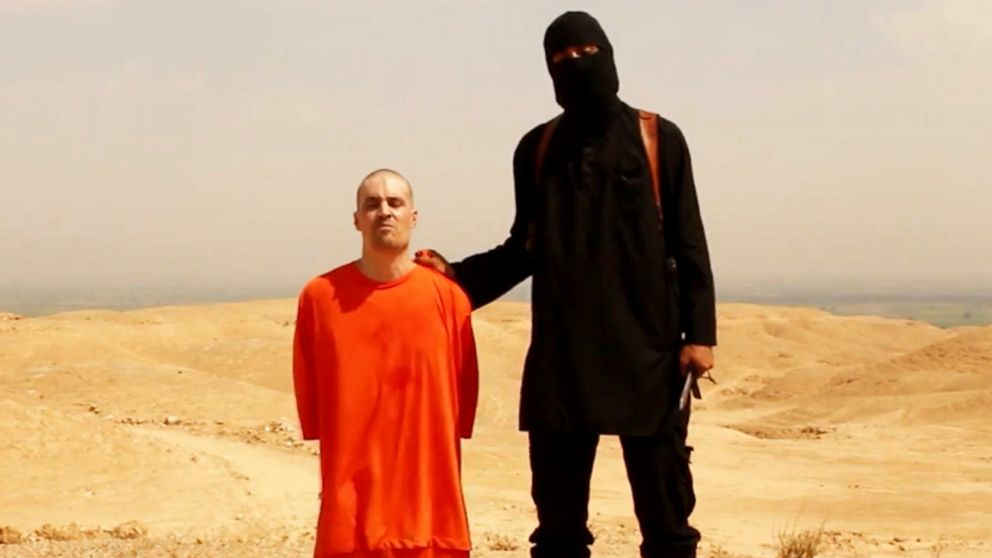IS Militants Behead US Journalist, Indian Muslims Attack the 'Barbarism'
Video Appears to Show Beheading of Journalist James Foley, Who Went Missing in Syria.

NEW DELHI: Islamic State (IS) militants, previously known as Islamic State of Iraq and the Levant (ISIL), have killed an American journalist, who was being held in Syria, saying that it was in response to United States strikes against the militants in Iraq.
A video circulated on Tuesday shows a masked IS militant beheading a kneeling man dressed in an orange jumpsuit, who has been identified as James Wright Foley, a photojournalist who went missing in Syria in 2012.
The victim was forced to read a statement blaming the US for his murder, with the executioner directly linking his actions to the US President Barack Obama’s order to carry out air strikes in Iraq. The IS took responsibility for the execution, vowing to push through with further actions of revenge, including the execution of another captured American journalist, Steven Sotloff.
The beheading comes a day after US backed Iraqi and Kurdish forces took back Mosul Dam from IS militants, with the US military bombing over 90 targets in Iraqi territory.
IS militants have been rapidly gaining territory in Iraq, their advances resulting in a political crisis as pressure mounted on Iraqi Prime Minister Nouri-al-Maliki, who is blamed for pursuing sectarian policies, to resign. Whilst Maliki expressed his acceptance of the candidacy of Haider al-Ebadi and the world found their scapegoat, the IS advance shows no sign of letting up.
The militants are labelled Sunni militants, and their rise attributed to divisive policies by the Shia-dominated administration at the centre. Though sectarianism is certainly a factor, this is an oversimplification, especially as sectarianism was not a factor in Iraq prior to the US invasion of 2003. With the US supporting Shia ethno-political parties and propping them to power, a Sunni identity rooted in the context of victimhood, emerged in Iraq. The US support to Sunni militants fighting the Bashar-al-Assad regime in Syria, which includes IS, further facilitated the group’s rise.
This is not to suggest that the group represents a homogenous Sunni identity, with Sunni Muslims, amongst others, across the world condemning the militants actions.
In India, Indian Muslims recently issued a statement condemning the “brutal atrocities by IS against minorities in Iraq and Syria,” and denouncing “religious intolerance, persecution and violence in the name of Islam.”
Excerpts from the statement are as follows:
“Indian Muslims are shocked and pained by the brutality and atrocities being perpetrated by the IS against Christians, Shias, Kurds, Yazidis and other minorities in the regions now under their control. We strongly condemn such barbarism which is against the teachings of Islam.”
“The barbaric conduct of the IS is all the more reprehensible because its leader, Abu Bakr al-Baghdadi, proclaims to be the ‘Caliph’ of the entire Muslim world and his armed group are supposedly acting in the name of Islam. We welcome the fact that most religious leaders and Islamic scholars from across the world, including India, have debunked al-Baghdadi’s claim of being a Caliph.”
“Alongside the ongoing tormenting of common citizens and persecution of religious and ethnic minorities in areas under their control, the ISIS has been enforcing its own intolerant, extremist, violent, distorted interpretation of Islam on Muslims who are also Sunnis. This too deserves to be condemned in the strongest possible words.”
“The unspeakable atrocities and mass crimes against Iraq’s minorities are nothing short of ‘crimes against humanity’, ‘religious/ethnic cleansing’.”
“While the ISIS must be held fully responsible for its unconscionable acts, the United States, Saudi Arabia, UAE, Kuwait etc. cannot escape their share of the blame in fuelling the flames. The worsening plight of Iraq’s Christians is but a legacy of America’s illegal, unwarranted and criminal invasion of Iraq in 2003 and its subsequent engineering of sectarian strife to divide the Iraqi resistance to the occupation.”
The statement has been signed by Muslims in India from a variety of fields, including Asif Naqvi, Imanul Haque, Irfan Engineer, Irfan Habib, Javed Malick, Mushirul Hasan and Zoya Hasan.
The statement joins Muslims across the world who have condemned IS, Iyad Ameen Madani, the Secretary General for the Organization of Islamic Cooperation -- a group that represents 57 countries; Turkey's top cleric, Mehmet Gormez; Egypt’s Grand Mufti Shawqi Allam, amongst several others.



